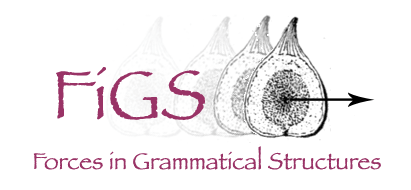Call for papers
Ever since the Davidsonian revolution in semantics, it
has been recognized that an adequate theory of meaning must somehow make
reference to events. More recently, there has been growing interest in the
proposal that theories of meaning should also refer to causal relations
between events, or to actions or properties that cause events, i.e., forces.
(We like this term better than "causes" because it does not presuppose that
the effect is actually brought about.) Forces seem to be useful in several
different, but related, areas of linguistic interest.
The first area is argument structure of the verb and voice,
of causatives, applicatives, and unaccusatives. The 'Agent' vs. 'Causer'
distinction, clear in 'stimulus' readings of psych-causatives (John/The
TV surprised Mary), and in Agent-possessor event nominalizations (The teacher's/Pique's
separation of Mary and Sue), has been loosely connected to animacy, but
intentionality, understood as the ability to control the course of the event,
may be more relevant. The availability of unaccusative structures for intransitive
verbs has been correlated with the notion of 'internal causation', in which
the internal constitution of a entity is such that the verbal action is
produced inexorably; it would be interesting to consider this insight in
the light of theories of inertia worlds. And notions of causation seem equally
relevant to understanding serial verb constructions.
The second is that of aspect. Atelic/imperfective forms
or readings of telic verb phrases express an interruption in the natural
course of events that is computed from the lexical meanings of the predicates
involved. Perfectivity has been observed to interact with animacy, again
perhaps implicating inertia and control -- imperfectives of permission verbs,
for example, are possible with animate permitters but not inanimate ones
in Greek and Italian. Verb forms that express out-of control actions, failed
actions, or successful actions have been studied in Austronesian and Salish
languages; a view of aspect that took note of forces might provide an understanding
of how these forms interact with aspect.
The third area is that of modality. For example, inertia
worlds can be thought of as worlds in which no external forces intervene
with a certain causal chain of events. A force itself could thus be thought
of as an impetus towards an ideal set of worlds, and so any modality that
could be spoken of in terms of an ordering source could also be spoken of
in terms of forces. Evidentials, as well as modalities of natural law, disposition,
and ability, all traditionally more resistant to possible world analyses,
might fare better by considering how to represent forces.
The fourth topic of interest is that of causal relations
in the domain of complex sentences and the study of the types of constructions
and morphosyntactic means of expressing such relations (clause-ordering,
conjunctive particles, prepositions, pragmatic markers, etc.). Relations
between an antecedent and a consequent event may be expressed in a variety
of ways, as sequential events based on the logical order of implication
(cause-consequence) or in non-sequential order (consequence-cause) based
on inferential or epistemic relations. These constructions often have different
discourse and argumentative functions and evidence different types of syntactic
hierarchy. These four topics have much in common, but because they fall
into different parts of the phrasal structure, it is rare that they are
all discussed together. We would like to remedy that situation by gathering
together researchers interested in how forces and causal relations are represented
in grammatical structures. Recognizing that linguists are not the only ones
interested in these questions, we warmly welcome submissions from psychology,
philosophy, and computer science, and will actively structure the workshop
to maximize interdisciplinary exchange.
The meeting is intended to be something of a hybrid between a workshop and a conference, with a relatively large number of invited speakers, and no more than ten or twelve non-invited talks, along with a robust poster session. We solicit papers for the non-invited talks and posters on these and related topics:
- How is causation represented in cognitive systems, semantics, and/or syntax?
- How are physical forces represented in cognitive systems, semantics, and/or syntax? Are "mental forces," e.g., intentions, obligations, man-made laws, information, represented similarly?
- What is an agent? What is an inanimate causer? What properties do the forces they exert have, and how are these relevant to the grammar?
- What is the relationship between the acquisition of language and the acquisition of naïve theories of physics and mind?
Abstracts are invited for 20-minute talks (plus 10 minutes
of discussion), and a poster session. Submissions are limited to one individual
and one joint abstract per author. Abstracts may be submitted in either
French or English.
Abstracts should be anonymous, and limited to two pages (using 1'' margins on all sides and 11pt font size). Any non-standard fonts should be embedded in the PDF document.
We strongly prefer submissions by email, sent to . Please attach the abstract with subject line ABSTRACT and include the following information in the email:
- Name(s) of author(s)
- Affiliation(s) of author(s)
- Email(s) of author(s)
- Title of abstract
- Whether the abstract should be considered for the poster session
